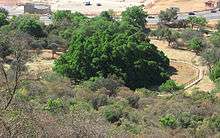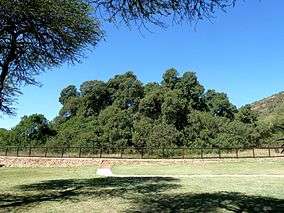Wonderboom Nature Reserve
| Wonderboom Nature Reserve | |
|---|---|
|
The Wonderboom grove | |
 Wonderboom | |
| Location | Gauteng |
| Nearest city | Pretoria |
| Coordinates | 25°41′13″S 28°11′30″E / 25.6870°S 28.1918°ECoordinates: 25°41′13″S 28°11′30″E / 25.6870°S 28.1918°E |
| Area | 200 hectares (490 acres) |
| Governing body | City of Tshwane |
| http://www.tshwane.gov.za/wonderboom.cfm | |
The Wonderboom Nature Reserve is a 1 km² reserve that incorporates a section of the Magaliesberg range in the northern portion of the Pretoria metropole, South Africa. Its main attractions are the Wonderboom (Afrikaans for "Marvel tree") near the reserve entrance in Lavender street and the derelict Fort Wonderboompoort on the crest of the Magaliesberg, that was constructed towards the end of the nineteenth century. The latter is reached by following the steep, paved walkway that leads from the picnic area to the summit. The vicinity of the fort ruins also afford sweeping views of the city.
Wonderboom

The well-known Wonderboom is a dense grove of parent and daughter trees of the species Ficus salicifolia, that descended from a central bole of about a thousand years old.[1][2] It is situated at the northern base of the Magaliesberg, and two circular walkways currently protect it from pedestrian traffic around its trunk and roots. As it has grown, its outlying branches have rooted themselves around the parent tree. This has repeated until there are now three layers of daughter trees encircling the mother fig, with 13 distinct trunks, covering a 50m area.
Other features
Other features of the Wonderboom Nature Reserve include a Stone-Age site that has produced the largest single accumulation of Neolithic tools ever found in South Africa and an Iron-Age site. Larger game species such as impala and zebra roam the reserve, and a breeding pair of black eagles have raised chicks in the reserve since 2010.[3]
See also
References
- ↑ Palmer, Eve (1977). A Field Guide to the Trees of Southern Africa. London, Johannesburg: Collins. pp. 91–93. ISBN 0-620-05468-9.
- ↑ Palgrave, K.C. (1984). Trees of Southern Africa. Cape Town: Struik. pp. 113–114. ISBN 0-86977-081-0.
- ↑ Esterhuyse, Seugnet (18 September 2013). "Kragdrade nou veiliger". Beeld. Retrieved 24 September 2013.
